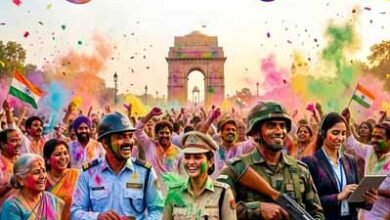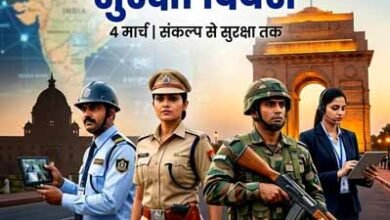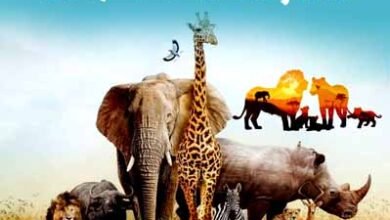
भगवान बिरसा मुंडा…
भगवान बिरसा मुंडा भारतीय इतिहास के एक ऐसे वीर योद्धा, समाज सुधारक और जन नायक थे, जिन्होंने ब्रिटिश शासन के खिलाफ आदिवासी अधिकारों और स्वाभिमान के लिए संघर्ष किया. उन्हें आज भी जन जातीय समाज में ‘भगवान’ का दर्जा दिया जाता है और उनके जन्मदिन (15 नवंबर) को ‘जन जातीय गौरव दिवस’ के रूप में मनाया जाता है.
बिरसा मुंडा का जन्म 15 नवंबर 1875 को वर्तमान झारखंड के खूंटी जिले के उलिहातु गाँव में एक गरीब मुंडा परिवार में हुआ था. उनके पिता का नाम सुगना पुर्ती (मुंडा) और माता का नाम करमी पुर्ती (मुंडा) था. उनका बचपन का नाम दाउद मुंडा था. गरीबी और अभावों के बावजूद, उन्होंने अपनी प्रारंभिक शिक्षा साल्गा गाँव में प्राप्त की और बाद में चाईबासा के गोस्नर इवेंजेलिकल लुथरन चर्च विद्यालय में भी पढ़ाई की. इस दौरान वे वैष्णव धर्मगुरु आनंद पांडे के संपर्क में आए, जिससे उन्हें धार्मिक और सामाजिक मूल्यों की गहरी समझ मिली.
बिरसा मुंडा ने अपने बचपन से ही ब्रिटिश शासन और स्थानीय जमींदारों (दलालों) द्वारा आदिवासियों पर हो रहे अत्याचारों और शोषण को देखा था. अंग्रेजों ने अपनी नीतियों के तहत आदिवासियों की जल, जंगल और जमीन पर उनके पारंपरिक अधिकारों को छीनना शुरू कर दिया था. वर्ष 1894 में लागू छोटानागपुर वन सुरक्षा कानून ने मुंडा जनजाति के सामने जीवन-निर्वाह की गंभीर समस्या खड़ी कर दी. इस दमनकारी व्यवस्था के खिलाफ बिरसा मुंडा ने आदिवासियों को संगठित करना शुरू किया.
वर्ष 1895 में, बिरसा मुंडा ने ‘बिरसाइत’ नामक एक नए धर्म की स्थापना की. उन्होंने आदिवासियों को अंधविश्वास, नशाखोरी और सामाजिक कुरीतियों से दूर रहने का उपदेश दिया. उन्होंने एक ईश्वर ‘सिंगबोंगा’ की अवधारणा पर जोर दिया और लोगों को अपनी सांस्कृतिक धरोहर और सामुदायिक भूमि स्वामित्व के अधिकारों के प्रति जागरूक किया. उनकी लोकप्रियता तेजी से बढ़ी और हजारों आदिवासी उनके अनुयायी बन गए.
बिरसा मुंडा ने अंग्रेजों और जमींदारों के खिलाफ एक बड़े विद्रोह का बिगुल फूंका, जिसे ‘उलगुलान’ (महान विप्लव) के नाम से जाना जाता है. इस आंदोलन का मुख्य नारा था: “अबुआ दिशुम, अबुआ राज” (हमारा देश-हमारा राज).
उलगुलान के मुख्य उद्देश्य: –
= आदिवासियों की छीनी गई भूमि को वापस लेना.
= ब्रिटिश हुकूमत को अपने क्षेत्र से बाहर भगाना.
= बाहरी लोगों के शोषण से मुक्ति.
= सामाजिक कुरीतियों को दूर करना और एक नए, शुद्ध धार्मिक मार्ग का अनुसरण करना.
= न्यायपूर्ण और शोषण-मुक्त समाज का निर्माण.
बिरसा मुंडा के नेतृत्व में आदिवासियों ने अंग्रेजों के खिलाफ गुरिल्ला युद्ध शुरू किया. उन्होंने ब्रिटिश अधिकारियों, जमींदारों और मिशनरियों को निशाना बनाया, जो आदिवासियों का शोषण कर रहे थे. बिरसा मुंडा की बढ़ती लोकप्रियता और उनके आंदोलन की व्यापकता ने अंग्रेजी हुकूमत को चिंतित कर दिया.
वर्ष 1895 में, अंग्रेजों ने बिरसा मुंडा को राजद्रोह के आरोप में गिरफ्तार कर लिया और उन्हें दो साल की सजा सुनाई. जेल से रिहा होने के बाद भी उन्होंने अपना संघर्ष जारी रखा. 9 जनवरी 1900 को, डोम्बारी बुरु में अंग्रेजों और आदिवासियों के बीच एक भीषण लड़ाई हुई, जिसमें कई आदिवासी शहीद हुए.
अंततः, 3 फरवरी 1900 को बिरसा मुंडा को गिरफ्तार कर लिया गया और रांची जेल में डाल दिया गया. 9 जून 1900 को, मात्र 25 वर्ष की आयु में, उनका निधन हो गया. अंग्रेजों ने दावा किया कि उनकी मृत्यु हैजा से हुई थी, लेकिन कई लोग मानते हैं कि उन्हें जेल में जहर देकर मारा गया था.
बिरसा मुंडा ने भले ही कम उम्र में ही इस दुनिया को अलविदा कह दिया, लेकिन उनके ‘उलगुलान’ ने ब्रिटिश शासन को हिला दिया और आदिवासियों में स्वतंत्रता की अलख जगाई. उनका नाम हमेशा आदिवासी प्रतिरोध और भारतीय स्वतंत्रता संग्राम के एक महान नायक के रूप में याद किया जाएगा.
========== ========= ===========
Bhagwan Birsa Munda…

Bhagwan Birsa Munda was a brave warrior, social reformer and public leader of Indian history, who fought for tribal rights and self-respect against the British rule. He is still given the status of ‘God’ in the tribal society, and his birthday (15 November) is celebrated as ‘Tribal Pride Day’.
Birsa Munda was born on 15 November 1875 in a poor Munda family in Ulihatu village of Khunti district of present-day Jharkhand. His father’s name was Sugana Purti (Munda), and his mother’s name was Karmi Purti (Munda). His childhood name was Daud Munda. Despite poverty and deprivation, he received his early education in Salga village and later also studied at Gosner Evangelical Lutheran Church School in Chaibasa. During this time, he came in contact with Vaishnav religious leader Anand Pandey, which gave him a deep understanding of religious and social values.
Birsa Munda had seen the atrocities and exploitation of the tribals by the British rule and the local landlords (dalals) since his childhood. Under their policies, the British started snatching away the traditional rights of the tribals on water, forest and land. The Chotanagpur Forest Protection Act, implemented in the year 1894, created a serious problem of livelihood for the Munda tribe. Birsa Munda started organizing the tribals against this oppressive system.
In the year 1895, Birsa Munda founded a new religion called ‘Birsait’. He preached to the tribals to stay away from superstition, drug addiction and social evils. He emphasized the concept of one God ‘Singbonga’ and made people aware of their cultural heritage and rights of community land ownership. His popularity grew rapidly, and thousands of tribals became his followers.
Birsa Munda blew the trumpet of a big revolt against the British and the landlords, which is known as ‘Ulgulan’ (Great Uprising). The main slogan of this movement was: “Abua Dishum, Abua Raj” (Our country-our rule).
Main objectives of Ulgulan: –
= To take back the land snatched from the tribals.
= To drive the British rule out of their area.
= Freedom from exploitation by outsiders.
= To remove social evils and follow a new, pure religious path.
= Creation of a just and exploitation-free society.
Under the leadership of Birsa Munda, the tribals started a guerrilla war against the British. They targeted British officers, landlords and missionaries, who were exploiting the tribals. The growing popularity of Birsa Munda and the widespread spread of his movement worried the British government.
In the year 1895, the British arrested Birsa Munda on charges of treason and sentenced him to two years. Even after being released from jail, he continued his struggle. On 9 January 1900, a fierce battle took place between the British and the tribals in Dombari Buru, in which many tribals were martyred.
Finally, on 3 February 1900, Birsa Munda was arrested and put in Ranchi jail. On 9 June 1900, at the age of just 25, he died. The British claimed that he died of cholera, but many believe that he was poisoned to death in jail.
Birsa Munda may have said goodbye to this world at an early age, but his ‘Ulgulan’ shook the British rule and awakened the spirit of freedom among the tribals. His name will always be remembered as a great hero of tribal resistance and the Indian freedom struggle. The state of Jharkhand was established on the occasion of his birthday on November 15, 2000, which is another big tribute to his contribution.





